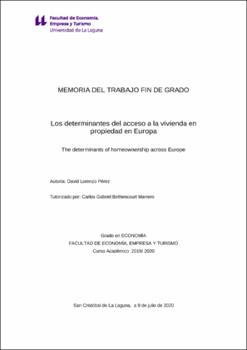Los determinantes del acceso a la vivienda en propiedad en Europa
Autor
Lorenzo Pérez, DavidFecha
2020Resumen
El modo en el que los individuos acceden a las viviendas presenta grandes diferencias en el
entorno europeo. En España, por ejemplo, el índice de vivienda en propiedad resulta ser un 50%
superior al alemán o al austriaco, donde el alquiler es la forma más extendida. El objetivo de
este trabajo es identificar los factores más relevantes que determinan el modo de acceder a una
vivienda (propiedad versus alquiler). Para ello, se estiman varios modelos que incluyen
indicadores sociales y económicos para Europa en 2016. En contra de la hipótesis inicialmente
planteada, los resultados muestran que los ingresos medios de los hogares es una variable
significativa pero que afecta negativamente al porcentaje de vivienda en propiedad. También se
encuentra que el porcentaje de personas mayores de 65 años y la tasa de empleo de las mujeres
son significativas y se relacionan negativamente con el porcentaje de vivienda en propiedad. Housing patterns show big differences across Europe. For example, the Spanish homeownership
index is about 50% higher than in Germany and Austria, where renting is the common way of
housing. The main goal of this project is identifying the most relevant factors explaining the
decision of housing in Europe (homeownership versus renting). To do that, we have estimated
several models including key social and economic indicators for 2016. We obtain that household
income is the most significant explanatory variable but, against the departing hypothesis, this
variable income has a negative effect on the homeownership index. Besides, we found that the
percentage of people over 65 years and the female employment rate are significant explanatory
variables and they also have a negative relationship with the homeownership index





